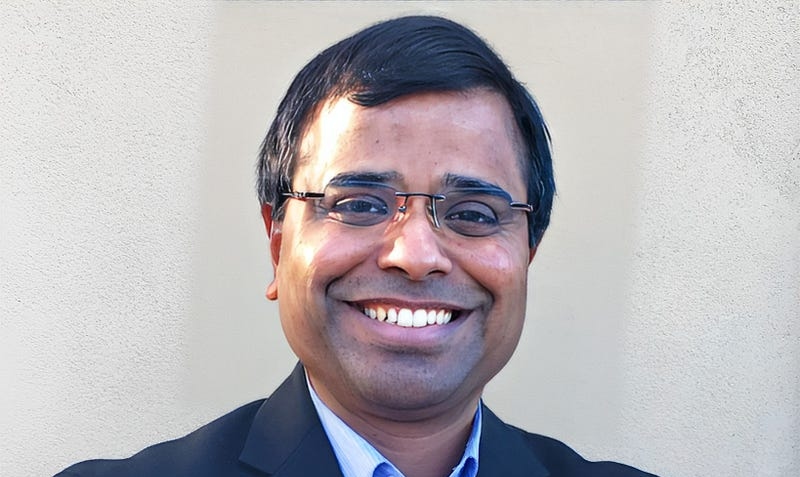Practice a tell me more approach to extract the real genius from your people.
The number one leadership initiative in any organization today is improved coaching. Coaching empowers employees, empowerment drives engagement, and engagement drives performance. At its core, coaching is about transformation. Leading distributed teams requires transforming how we coach and changing our play calls and playbooks to get things done. As a part of our interview series called “Moving From Command & Control to Coaching & Collaboration; How Leaders and Managers Can Become Better Coaches,” we had the pleasure to interview Ravishankar Gundlapalli.
Ravishankar Gundlapalli is an Entrepreneur, Author and Speaker passionate about helping people achieve their true potential. Be it employees in a company, first-time entrepreneurs, career professionals or students, Ravi finds happiness in helping them make the right connections, learn new skills to accomplish more and achieve career milestones.
Thank you for joining us to explore a critical inflection point in how we define leadership. Our readers would like to get to know you better. What was a defining moment that shaped who you are as a leader?
I missed a near-fatal airline accident ten years ago that dramatically changed how I look at life. This created a sense of urgency within me to create a legacy and leave something good and positive for the world. I decided to champion the cause of mentoring as a force to transform people’s lives and careers.
John C. Maxwell is credited with saying, “A leader is someone who knows the way, goes the way, and shows the way.” How do you embody that quote as a leader?
Leaders must lead by example, walk the walk, and talk the talk. I never ask someone to do something if I myself am not comfortable doing it. I started my career as a research & development engineer, and over the years grew to be a project manager, program director, and an industry BU leader before launching my own company, MentorCloud. Having gone through those career roles, I have a deep appreciation of what it takes for people to succeed. Rather than give orders or deadlines, my approach is to sit with the team and get them on a path so that they become successful in their projects.
How do you define the differences between a leader as a manager and a leader as a coach?
A leader as a manager is entirely focused on their KPIs for the role e.g. P&L, sales numbers, and # of releases. As a manager, you are responsible for achieving hard business goals.
As a coach, your role is to bring out the best in each and every member of the team. In this role, you are focused less on hard business goals and more on the people, their innate genius, and how to bring the genius within them.
Before we go into Leaders as Coaches, how do you as the author of The Art of Mentoring, view coaching vs mentoring? Do some leaders need to also be great mentors?
This is the question I get asked the most often. My definitions for coaching and mentoring are as follows:
When you tap into someone’s genius, you are in a coaching relationship. By genius, I am referring to the innate talents of an individual and what they naturally excel at doing. What a coach does is engage in a conversation that brings out the talents of their coachees, while making the coachees recognize the blind spots that may be blocking their ability to succeed.
When you tap into someone’s wisdom, you are in a mentoring relationship. By wisdom, I mean knowledge within the proper context. It is not just about how to do a certain task but also when to do it and knowing why you are doing it. What a mentor does is share stories from their own experiences, what approaches have worked and not worked for them, and how certain activities are done in the organization that has in the past brought stellar results. Here the mentor is directly transferring their experiential knowledge or wisdom to their mentees.
Leaders need to be able to play both roles for their team members. Occasionally, they will need to show how to complete a task. At other times, they need to inspire their team members to perform at their best.
We started our conversation by noting that improved coaching is the number one leadership initiative in any organization today. What are some essential skills and competencies that leaders must have now to be better coaches?
Empathy is of utmost importance. As a leader, you are dealing with people so you need to have empathy along with compassion. You need immense patience and give your people space to make mistakes, to grow and blossom into their fullest potential. You need to ask the right questions and let your people think, respond, own their responses and be accountable. Leaders as coaches must inspire more than they influence.
We’re all familiar with the adage, “You catch more flies with honey than with vinegar.” How are you inspiring — rather than mandating — leaders to invest in upskilling and reskilling?
Again, I lead by example. I attend webinars, take online courses, read business books, and through these actions, demonstrate that I am continuously learning and growing. That is how I inspire my team leaders to continuously upskill themselves. For my first job interview, after I finished my PhD, I was asked to create a presentation. I selected a quote by Will Rogers that said “Even if you are on the right track, you can get run over if you just sit there”. I imbibe this philosophy in my team that one needs to upgrade themselves continuously because the world around them is changing so rapidly.

Let’s get more specific. How do you coach someone to do their best work? How can leaders coach for peak performance in our current context? What are your “Top 5 Ways That Leaders and Managers Can Be Effective Coaches?”
As I mentioned earlier, coaching is about bringing out the genius in others. 5 ways leaders and managers can be effective coaches are:
1- Create an inspiring and welcoming environment.
2- Ask thoughtful questions and patiently wait for their answers.
3- Practice a tell me more approach to extract the real genius from your people.
4- Be an active listener without interrupting.
5- Provide a safe space for your people to be vulnerable.
We’re leading and coaching in increasingly diverse organizations. And one aspect of workforce diversity on the rise is generational diversity. What advice would you offer about how to effectively coach a multi-generational workforce? And how do you activate the collective potential of a multi-generational workforce?
It is not easy to coach people from multiple generations. Empathy and patience are necessary to let people be themselves and express what they mean without feeling that they are being judged. Another skill that’s necessary is also listening with the intent to learn and not listening with the intent to respond.
The collective potential of a multi-generation workforce can be activated today by creating collaborative working environments, connecting people as mentors and mentees, catalyzing conversations, and providing mechanisms for people to learn from each other. Our company MentorCloud does exactly that for large organizations, providing a technology platform to activate and tap into the collective wisdom of the people within an organization.
You’re referring to emotional intelligence, in a sense. What are two steps every leader can take to demonstrate a higher level of emotional intelligence?
Leaders should be calm and balanced, to be able to lead others. The leader must seek to understand his or her people.
Words matter. And we’re collectively creating a new leadership language right now. What are the most important words for leaders to use now?
The most important words for leaders today are: purpose, empathy, belonging, resilience, and collaboration
I keep inspiring quotes on my desk. What’s your favorite “Life Lesson Quote,” and why does it mean so much to you?
“Dream is not what you see when you are asleep, a dream is what keeps you awake” by former President of India, Dr. APJ Kala. This is a favorite quote of mine. It summarizes the mindset and journey of a true entrepreneur. I have a dream to impact 100 million people with the transformative power of mentorship, and that dream keeps me energized and going, in spite of struggles and obstacles.
Our readers often like to continue the conversation. What’s the best way for readers to connect with you and stay current on what you’re discovering?
LinkedIn is the best way to connect and follow my work. I can be found here: https://www.linkedin.com/in/ravishankargundlapalli/ I also started a podcast recently called ‘The Mentorship Podcast’ where I gather inspiring mentorship stories.
Thank you for sharing your insights. We appreciate the gift of your time and wish you continued success and good health.


